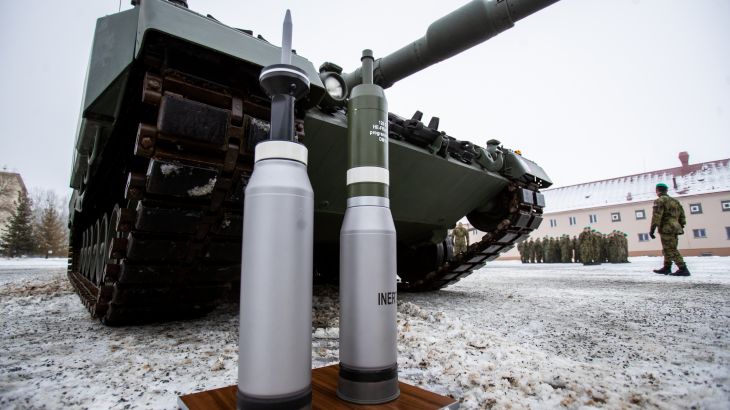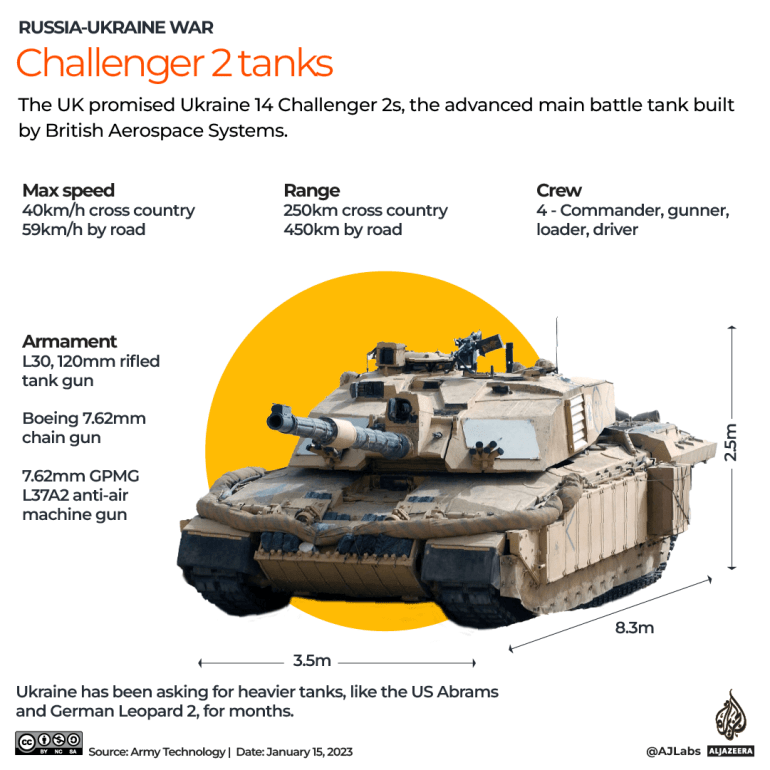No Leopard tanks for Ukraine as NATO allies fail to agree
The failure to agree to provide German tanks to Ukraine may signal growing divisions within NATO over supplying heavy weapons amid Russian warnings.

The United States and its allies failed to agree on supplying coveted German battle tanks to Ukraine as Russia issued veiled threats the war could escalate in Europe.
NATO and defence leaders from about 50 countries met at the American Ramstein Air Base in Germany on Friday, the latest in a series of arms-pledging conferences since Russia invaded Ukraine 11 months ago.
Keep reading
list of 4 itemsGermany heads for showdown over tanks for Ukraine
Medvedev warns of nuclear war if Russia defeated in Ukraine
Mapping the battle for Ukraine’s Bakhmut
European leaders at the meeting again pressed Germany to give the green light for the delivery of German-made Leopard 2 tanks to Ukraine to drive back Moscow’s forces – although no decision was made.
The failure to agree to provide the tanks may signal growing divisions within NATO over supplying such weapons.
Germany’s defence minister Boris Pistorius denied Berlin was unilaterally blocking the delivery of the Leopard 2 tanks to Ukraine, but said his government was ready to move quickly on the issue if there were consensus among allies.
“There are good reasons for the deliveries and there are good reasons against, and in view of the entire situation of a war that has been ongoing for almost one year, all pros and cons must be weighed very carefully,” he said, without elaborating on the reasons.
Pressure has been building on Berlin to provide tanks to Kyiv that Ukraine sees as key in the war against Russia.
The impression “there is a united coalition and that Germany is standing in the way is wrong”, Pistorius said, adding “there are many allies who say we share the view that I have put forward here.”

Pistorius said while there was no decision yet on whether to send the Leopard tanks, “We will make our decisions as soon as possible.”
“I am very sure that there will be a decision in the short term but … I don’t know how the decision will look,” he said.
Leopard tanks are seen as especially suitable as they are widely in use, meaning several countries could each chip in some of their tanks to support Ukraine.
‘Cause for regret’
Russia, meanwhile, said the West supplying battle tanks to Ukraine will not change the course of the war and Kyiv’s allies will regret their “delusions” that such a move will prove victorious on the battlefield.
“We have repeatedly said that such supplies will not fundamentally change anything, but will add problems for Ukraine and the Ukrainian people,” Kremlin spokesman Dmitry Peskov told reporters.
Asked whether the supply of increasingly advanced weapons to Ukraine meant the conflict was escalating, he added, “We see a growing indirect and sometimes direct involvement of NATO countries in this conflict.
“We see a devotion to the dramatic delusion that Ukraine can succeed on the battlefield. This is a dramatic delusion of the Western community that will more than once be cause for regret.”
Peskov said the way to prevent escalation was to heed the strategic concerns that Russia expressed in late 2021, just before it invaded Ukraine.
Before launching its February 24, 2022, invasion, Moscow blamed NATO for undermining the region’s security and sent a list of security demands to the United States.
Russia asked NATO and its allies to ban Ukraine and former Soviet nations from joining the alliance, and called on NATO to scale back activities in Eastern Europe.
Kyiv and Western countries have said these were baseless pretexts for an “imperial-style land grab” in Ukraine.
‘Decision must be made’
Ukrainian President Volodymyr Zelenskyy said on Friday there was “no alternative” but for the West to give Ukraine battle tanks.
“The partners are principled in their attitude – they will support Ukraine as much as is necessary for our victory,” said Zelenskyy in his evening address.
“Yes, we will still have to fight for the supply of modern tanks, but every day, we make it more obvious that there is no alternative, that a decision about tanks must be made.
“The only thing worth emphasising in all this is the time, the delivery time. Each arrangement must be carried out as quickly as possible – for our defence.”
US defence chief Lloyd Austin urged allies to step up support for Ukraine.
“Russia is regrouping, recruiting, and trying to re-equip,” he said at the start of the Ramstein meeting. “This is not a moment to slow down. It’s a time to dig deeper. The Ukrainian people are watching us.”
The US announced an additional $2.5bn in military aid for Ukraine on Thursday, a package that will include more armoured vehicles and ammunition.
Finland announced a new donation of more than 400 million euros ($434m) worth of defence equipment for Ukraine, not including the German-made Leopard 2 tanks, which it said it could also send if there is an agreement with allies.
Poland said will provide Ukraine with additional Soviet-made T-72 tanks and some infantry vehicles.
“We must do everything to help Ukraine so the war does not spill over to NATO territory,” defence minister Mariusz Blaszczak said.
The influx of new weapons, tanks, and armoured carriers comes as Ukraine has faced intense combat in the country’s east around the city of Bakhmut. The battles are expected to intensify in the coming months.